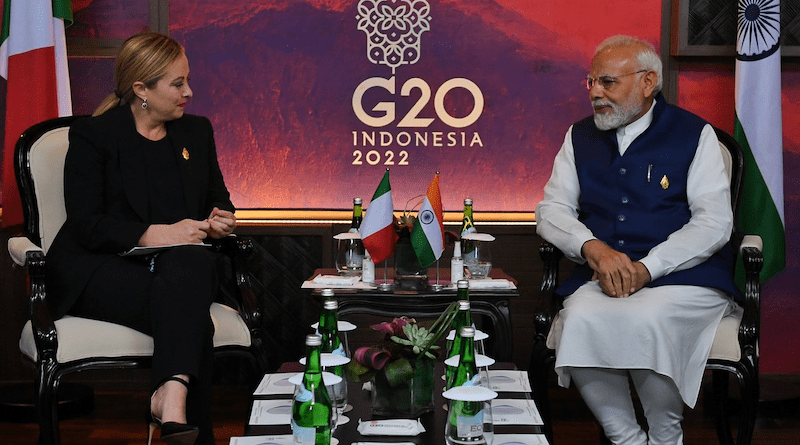India Seeks G20 Success Despite Considerable Tensions – OpEd
By Arab News
By Andrew Hammond*
Indian Prime Minister Narendra Modi has high hopes for this year’s G20 summit, even though it takes place amid the most unpredictable global landscape in decades.
On the one-year anniversary of Russia’s invasion of Ukraine, the G20 finance ministers are making final preparations for their meeting this weekend. Meanwhile, the foreign ministers have their own session in India next week.
In total, India will hold more than 200 meetings across some 50 cities, involving ministers, officials and civil society. The pinnacle of this will be the leadership summit in New Delhi in September, which will be attended by about 30 heads of state and government, from both G20 members and invited countries, including Bangladesh, Egypt, Mauritius, the Netherlands, Nigeria, Oman, Singapore, Spain and the UAE, plus international organizations such as the UN, the World Health Organization, the World Bank and the International Monetary Fund.
Amid the international divisions over Ukraine, Modi has to navigate the G20 agenda with his stance that the conflict must be resolved through dialogue and diplomacy. India has decided to primarily focus on green development, women’s empowerment, technological transformation and sustainable development.
He has called for a “depoliticization of the global supply of food, fertilizers and medical products, so that geopolitical tensions do not lead to humanitarian crises.” Moreover, he has called for international cooperation to deal with global issues, arguing that the challenges of “climate change, terrorism and pandemics can be solved not by fighting each other, but only by acting together.”
One of the big uncertainties in the G20 process is the involvement of Russia. New Delhi has said that Moscow, as a key G20 member, will be “participating in this process … the grouping needs to speak with one voice, particularly on important issues that are affecting the world.” However, President Vladimir Putin decided not to attend last year’s summit in Indonesia.
In part, this is because tensions over Moscow’s invasion caused diplomatic fireworks. G20 foreign ministers clashed repeatedly, with Russia’s Sergei Lavrov walking out of meetings at least twice, and there were none of the customary group pictures of the so-called G20 family. With the Ukraine issue proving so divisive, there are potentially huge barriers to constructive discussions taking place again this year.
However, it is not just the Ukraine conflict that will cause challenges. Tensions have also long been high between China and the West. In this context of uncertainty, Modi is determined to try to stamp his mark as G20 host, not least given that it may impact his reelection bid next year.
The reason Modi is so keen to chair proceedings in advance of domestic elections is the prestige that the G20 enjoys. Presidents and prime ministers will likely be in attendance from China, Germany, India, Japan, Australia, Brazil, the UK, Saudi Arabia, South Africa, Turkiye, France, Italy, Germany, Canada, South Korea, Argentina, Mexico, the EU, the US and possibly Russia too. Collectively, these powers account for some 90 percent of global gross domestic product, 80 percent of world trade and about 66 percent of the global population.
One priority for India is the outlook for the world economy amid continuing concerns that key nations, including much of the West, may enter recession this year. Also on the agenda at the finance meeting will be the potential global regulation of cryptocurrencies and rising debt troubles among developing countries.
In December, the World Bank asserted that the globe’s poorest countries owed $62 billion in annual debt service to bilateral creditors, a year-on-year increase of about a third, triggering a higher risk of defaults. India is reportedly drafting a proposal that will see G20 countries help debtor nations badly hit by the economic downturn by asking big lenders to write down some of these loans. Two-thirds of the debt burden is owed to China.
New Delhi will also give support for a push by the IMF and the World Bank for the G20 Common Framework. This is a scheme launched in 2020 to help poor countries delay debt repayments and it could be expanded to include middle-income countries.
All of this highlights why this year could be one of the most unpredictable G20s. While it could collapse into rancor, there is an outside possibility that significant agreements could be made.
Modi is well aware that, while the G20 is widely seen to have seized the mantle from the G7 as the premier forum for international economic cooperation and global governance, it has failed so far to realize the full scale of the ambition some have thrust upon it. In part, this is because it has no formal mechanisms to ensure the enforcement of agreements by world leaders.
Despite all these issues, the Indian presidency will try to exceed expectations outcomes-wise. Whether it does this will depend greatly on whether Ukraine conflict-related divisions between the West and Russia ameliorate or grow in the weeks ahead.
- Andrew Hammond is an Associate at LSE IDEAS at the London School of Economics.

